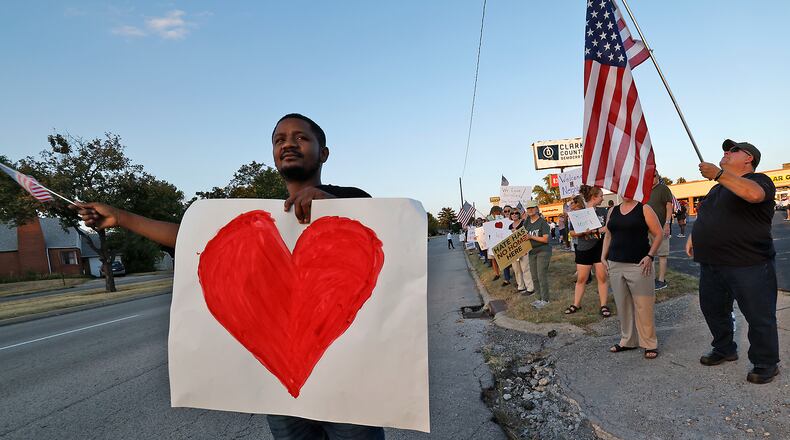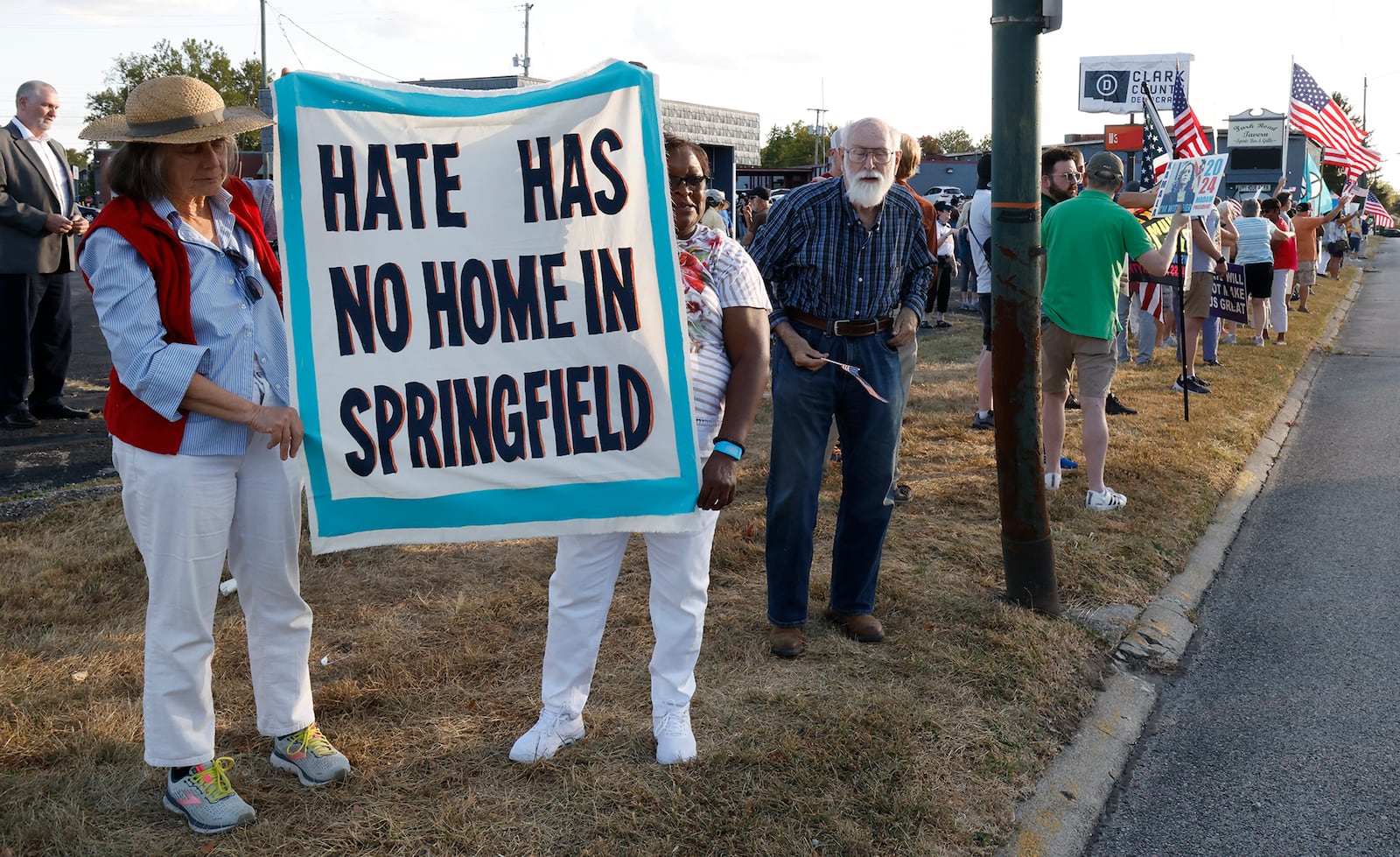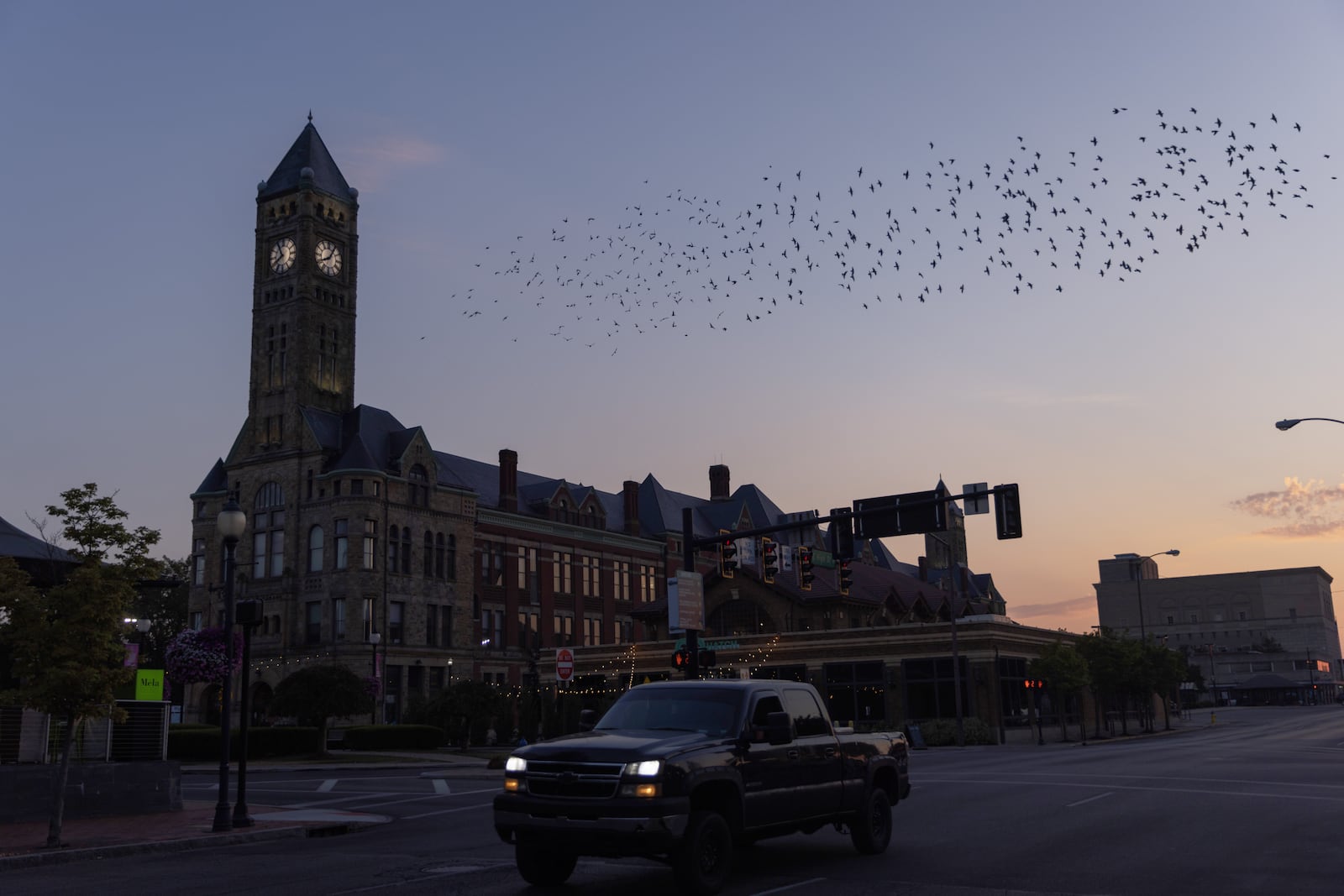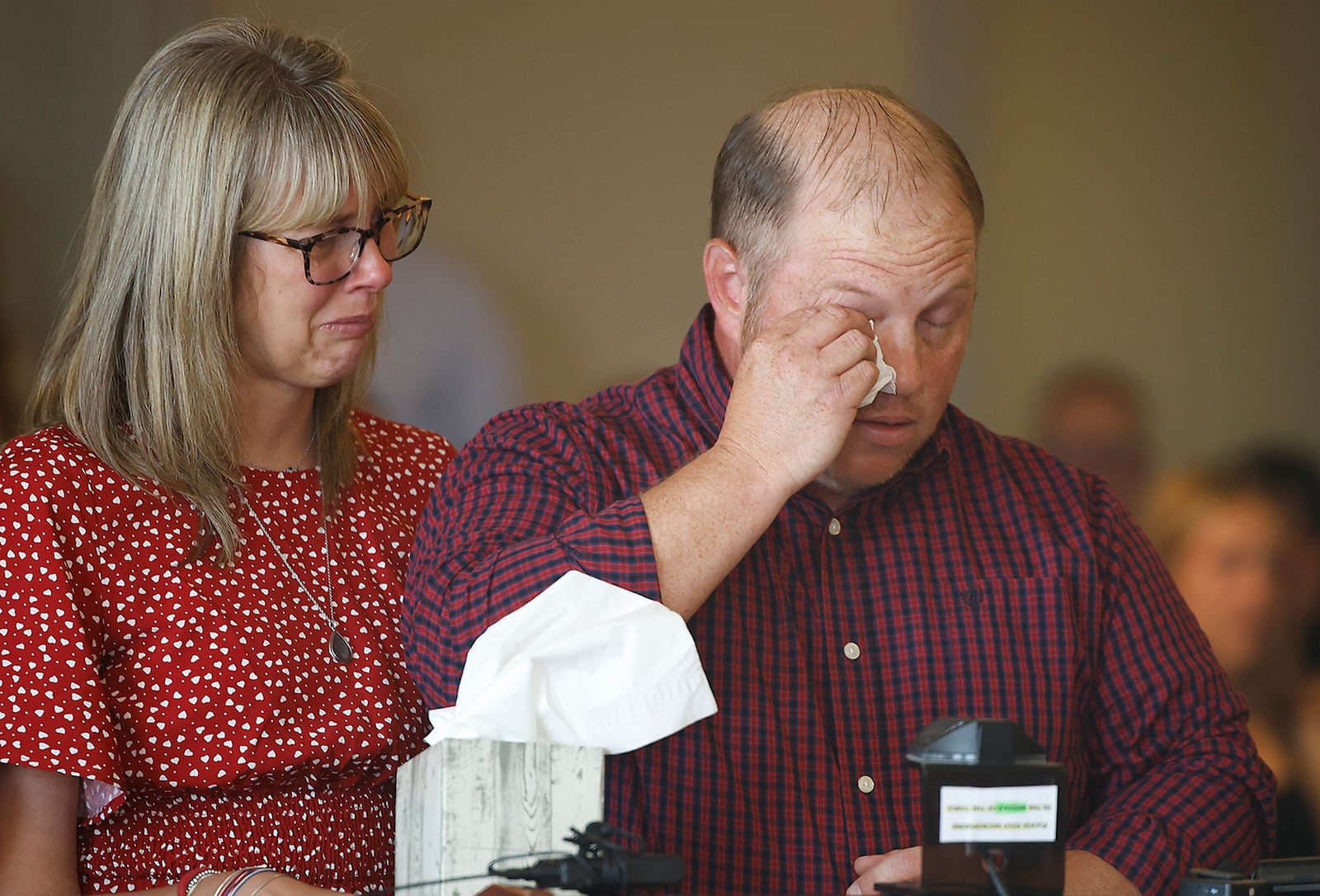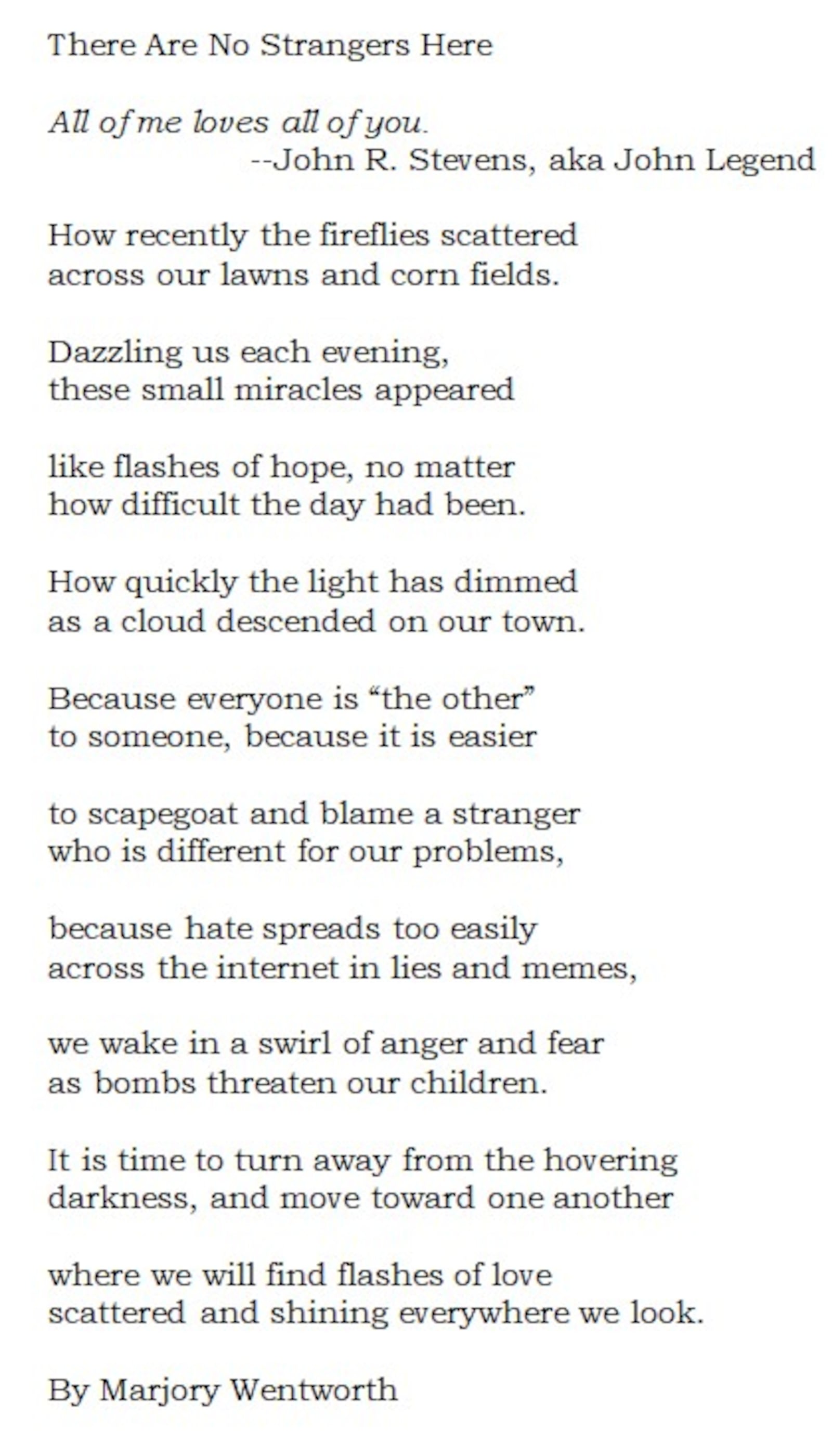My hometown is Springfield, Ohio. My mother’s grandfather and father moved their families to Xenia, Ohio from Carlisle, Kentucky prior to World War I. In 1913, my mother’s father moved to Springfield to work at the International Harvester Truck Plant (it was called White Truck Motors then). My great-grandfather and grandfather on my father’s side moved their families to Springfield from Griffin, Georgia in the early 1900′s.
Both sides of my family worked at International Harvester at the worst and most dangerous jobs whites would not do. All were proud Teamsters that used the union to provide benefits to their families. My father died in 1951 from black lung disease from shoveling coal for 30 years.
As a child I would listen to my mother, aunts and uncles about the hate and threats they would receive on a daily basis. My father and mother were so taken by the hate and vitriol they experienced, that they bought a piece of land near Urbana, Ohio (just north of Springfield) and moved my brothers and sisters there. Even though we lived in the country we experienced Springfield every day as my father and two sisters continued to work there; so, they had to deal with the overt and blatant racism.
My mother’s perseverance sent me on a college academic scholarship at Wittenberg University. Even at Wittenberg, I caught some of the racist language and hate. Many times I felt alone in the dark of night and felt as an individual being singled out by the glare of racism and the shackles of threats of violence.
I say to the Haitian community: “You are not alone.” My mother told all of my brothers and sisters to leave the area because of the danger. Although I now reside in a quiet suburb of Sacramento, California, my heart is still in that little house my family still owns.
This leads me to what is happening to the Haitians living there today. My mother was a strong Black woman who raised 11 children on her own. She raised her kids and managed her farm and showed me and my siblings how to let our light shine over the hate, vitriol and racism we experienced. My oldest brother, a Korean War veteran, still lives there, and Springfield residents know who he is as a respected member of the community.
What the Haitians are experiencing is what the region has always been: A place for hard-working people to come to and making a living while trying to blend in to the culture. The majority of people living in Springfield are OK with these new immigrants as long as they are there to become citizens.
To the Haitian community I say, there are those who want the world to see you as something other than the marvelous workers, parents, dream seekers and Americans that you really are. So I say to the Haitian community of Springfield and surrounding region… stay strong! Go about your business of working hard, learning the local culture and becoming the citizens you want to be. Don’t be bullied by threats and intimidation; let the haters know that you, too, are American.
- James F. Thrasher, Ed.D., Sacramento, CA
During my years as a student at the University of Dayton, I had an opportunity to interact with members of the Dayton community and beyond. I frequently commented to my family back in Erie, PA, that the spirit of the Ohioans I had encountered was warm and welcoming. Never did I feel that my status of having come to the area from elsewhere gave me diminished standing.
Because of these experiences, I was unsurprised, yet heartened, to learn of the many ways in which Springfield residents have welcomed Haitians to their community. As a (now retired) professor with a specialty in group psychology, I am aware of our human tendency to find people or things outside of ourselves on whom to affix anything in our lives or in ourselves that is troublesome. That is, we say to ourselves, “If only if it were not for this person or this group of people, we would not have this difficulty.” This tendency can be all the more pronounced when important figures in our world point the finger at some person or group. I am filled with admiration for the people of Springfield because they did not succumb to this tendency to externalize and scapegoat persons who have immigrated from Haiti. Even in the face of inflammatory rhetoric, threats of violence, and disruptions to everyday activities, the citizens of Springfield have held firm.
The residents of Springfield, Haitians and non-Haitians alike, have provided us with a remarkable model for how we should be with one another. Let us embrace their example.
- Virginia Brabender, Swarthmore, PA
Credit: Bill Lackey
Credit: Bill Lackey
I thought it might be helpful to your readers in Springfield, if as a New Englander, I reached out and let you know that many of us have been horrified first by the violent rhetoric directed to the Haitian immigrants in your community. The people of Springfield, like those in many American communities, admirably welcomed immigrants fleeing violence who are protected under the Temporary Protected Status Program (TPS). Many in my community and I think Springfield residents should be commended for their generous, practical and nurturing support of Haitian immigrants. One is encouraged as well by the Haitians willingness to assimilate into the work and social culture of Springfield. It is not easy for anyone, but it is and has been the work of Americans for hundreds of years. I, with my neighbors, wish you all well as you weather vicious, unconscionable attacks on your community.
- Susan J. Tracy, Amherst, MA
I want to express my admiration and support for the people of Springfield, Ohio, who are standing strong against hatred and division. In the face of false accusations (and outright lies), the people of Springfield are showing a remarkable commitment to unity, love, and justice. Baseless claims against the Haitian community have caused fear and unrest, leading to bomb threats and closures of schools and public buildings. Despite these challenges, we’ve seen Springfielders bravely rallying around their Haitian neighbors, supporting the community with both word and action. We are admiring your leaders, including Mayor Rue, Governor DeWine, and Senator Brown, as they condemn these harmful falsehoods while working to restore peace and truth in the community. From faith leaders like Pastor Carl Ruby welcoming Haitian community members into his church, to the diverse crowds filling local restaurants, Springfield is sending a powerful message: hatred cannot and will not prevail. Your collective effort is an inspiring example of people rejecting division and embracing our common humanity. In these troubling times, Springfield reminds us all of the importance of standing with marginalized communities and ensuring that fear and falsehoods have no place in our nation. Thank you, people of Springfield, for your bravery and compassion. You are showing the rest of the country (and the world) what true American values are. You are making many patriotic Americans very proud! Thank you.
- Lawrence Pareles, Amherst, MA
My heart goes out to the people of Springfield as these hateful false rumors about your immigrant community are perpetrated by political candidates. The bomb threats to your schools that resulted are unthinkable. We know that immigrants revitalize communities but also challenge them. Mayor Rue described Springfield as “a community that comes together and works together” to meet these challenges. I laud those in your community who have stood by the newcomers who left a devastated Haiti, and have been so unfairly maligned. They came to the United States legally in the American tradition of compassionate rescue efforts, just as my grandparents came as legal immigrants to escape persecution in Europe. As an American, I am proud of the bipartisan voices of your Republican mayor, Rob Rue and Republican Governor, Mike Dewine and Democratic senator, Sherrod Brown, who have called out the bigoted lies. They represent the best of America.
- Francine M. Deutsch, Amherst, MA
Credit: NYT
Credit: NYT
I want to tell you about my hometown, Springfield, Ohio. Springfield has been in the news, and not in an altogether good way. In the recent presidential debate, Donald Trump announced that in Springfield, the many Haitian immigrants were eating the dogs and cats Springfielder’s had as pets. This was clearly not the case, but you can’t unhear something like this once you have heard it.
I decided to find out what’s going on in my hometown, so I called some friends who still live there. After talking to my friends and doing lots of digging and using other trusted sources, here’s what I found out.
Not surprisingly, some of the principal businesses in town were experiencing a difficult time getting workers given our labor shortage. It is somewhat unclear from where the idea came, but some Springfield businesses and individuals charged with economic development, hatched a plan to appeal to legal Haitians to come to Springfield. Some are U.S. citizens, and some are there under a temporary stay program. They have come to Springfield in large numbers. The estimates are between eight and twenty thousand. Understand that Springfield had a population of about 60,000 when the influx started in about 2020. Part of what made the number so large was that early arrivers spread the word to other Haitian immigrants, particularly in Miami, that life in Springfield was good and affordable.
The new Ohioans are being paid about eighteen dollars an hour. Business is booming and the struggling city is finally experiencing growth, but at what price?
Not everyone is cheering. The infrastructure for this burgeoning group of workers and their families is badly stretched. Schools are crowded with youngsters who don’t speak English, traffic accidents are a growing problem as many lack driving skills. All infrastructure organizations charged with providing services are bursting. City officials are saying they were not told of the plans, so residents are seeking someone to blame. The situation proves the old adage that too much of a good thing can be harmful.
I can’t help reminiscing about the Springfield where I grew up. I rode my bike everywhere, usually with by beloved dog Sparkie following behind. At my grade school, she waited for me on the school’s front steps. The principal brought her in if it was too cold. My first job as an umpire was too far for the bike, so I hitch-hiked. I would get a ride within five minutes as people were nice. Unbridled joy for me was the day I made the high school baseball team. Springfield was almost Mayberry-like. I still enjoy the Springfield Facebook pages.
About the time I left college to join the Air Force, things began to change for my hometown. Crowell-Collier Publishing Co. began to downsize and then close and International Harvester began to struggle. These were the giant employers along with Wittenberg College, but there were a dozen or so mid-sized manufacturers who had between 100 to 300 employees each. Some successful Springfield businesses were merged with businesses located elsewhere. One by one, those successful businesses were gone. As they disappeared, the cities’ woes grew. This story occurred all over the states referred to as rust belt states. Springfield has fought hard to remain the wonderful place I remember.
I tip my hat to my hometown and believe it will solve the current dilemma. Our hometowns are part of who we are, and dogs are still loved in my hometown.
- Jim Rohrer, Evergreen, CO
Credit: Bill Lackey
Credit: Bill Lackey
As many Americans, I have been following the national fallout from the Sept. 10 presidential debate where one candidate chose to make unfounded about Haitian immigrants residing in Springfield — I won’t even repeat what was said as it was too horrific. I hope and pray the good citizens of Springfield will take this event as an opportunity to bring people together and begin the healing process. I have read and listened to Nathan Clark’s heartfelt comments to the Springfield City commission regarding his son’s death in August, 2023. What a beautiful tribute to his son, Aiden. If he and his family are any indication of what the citizens of Springfield are all about, I have no doubt you will come out stronger and more united than ever. Stay safe.
- Phil Leech, Spring Lake Township, MI
- Marjory Wentworth, Wright State University professor and former poet laureate of South Carolina
Credit: AP
Credit: AP
What happens when good, hard-working and diverse people with proud legacies of faith and culture meet for the first time in Smalltown, USA in 2024? What happens when this encounter, initially seen by some as a clash of identities and histories, reveals a shared humanity that deserves dignity, equitable rights, and access for all, as demonstrated by Jesus? A common humanity that is grappling with the global and national realities of hunger, climate change, conflict, war, and poverty?
Recently, these questions have become more visible in my hometown of Springfield, Ohio, where I spent most of my childhood and youth. Growing up in this “purple” world of Ohio, I experienced both generous hospitality and challenges from those who did not welcome minorities of African descent. Yet, like the Haitian community today, my family also came to the area in pursuit of educational and vocational opportunities for my parents and their children.
Places like Cedarville Bible College, Springfield South High School, the HBCUs in Wilberforce, Ohio (where my parents graduated), Zion Baptist Church in nearby Clifton, Ohio, and the Morris Bean Company were central to our lives. My family, neighbors, and institutions like St. John Missionary Baptist Church and Springfield schools shaped me and made Springfield my home. This, coupled with a strong faith rooted in a Pan-African worldview, taught me that Haiti, the North Star of freedom during the horrific period of my ancestors’ enslavement in the U.S., was also my home.
Today, leaders like Governor DeWine have reaffirmed Springfield City Manager’s statement that “there have been no credible reports or specific claims of pets being harmed, injured, or abused by individuals within the immigrant community.” He has taken action by providing much-needed financial support for both new and long-standing residents of Springfield. The recent Reuters report also highlights the growth of Springfield, driven by the partnership between old and new residents.
Springfield is uniquely positioned to become a model of what can happen when we choose love and hospitality over hate and the demonization of the so-called “other.” But during this contentious election season, we all face an important question: Will we choose radical love and hospitality, striving to live and struggle together as Jesus and his disciples did? Or will we choose hate, which ultimately leads to death? At Bread for the World, we advocate for a radical love that seeks to address the systemic issues of hunger and poverty, which contribute to the growing number of 117.3 million forcibly displaced people worldwide.
The love and hospitality I received in Springfield triumphed over hate. This legacy of Springfield and its neighboring small towns and villages is poised to do the same today, not only for our new Haitian residents but also for the many other “Springfields” across the U.S. and the world.
- Rev. Dr. Angelique Walker-Smith, Washington D.C.
Credit: AP
Credit: AP
I first traveled to Haiti in 1998 at my daughter’s request. I had little idea of where this country was, its history, culture, and its challenges. I returned home transformed! I have since returned to this enigmatic country more than 25 times.
Prior to my first trip, life was one of family, work, church, and comfort. I then realized how fortunate I was, in so many ways. Therefore, I decided to do what I could, and joined a non-profit that supported Grace Children’s Hospital, in Port-au-Prince. Now, I am on the board of a non-profit whose mission is to offer love, support, and hope to abandoned and orphaned HIV+ Haitian children.
My many trips to Haiti offered me an opportunity to understand selflessness, and to witness to others.
During my travels I have seen people who strive to eke out a living in spite of insurmountable odds. The vast majority of Haitians barely get by, with an annual per capita income of less than $1,700. Parts of the country are bereft with gangs, violence, and tragedy. Throughout my travels I have never witnessed people eating dogs and cats, preferring rice, beans, fruit, veggies, chicken, pork, beef, and an occasional goat.
I always found those I met as friendly, inquisitive, considerate, and generous, always praying for my safety and well being. Those with whom I have worked possessed a zeal to improve, learn, and strive for a better life. For those Haitians who are fortunate enough to leave Haiti, there are great costs associated. A passport application usually costs at least $300, even if it isn’t approved. Unless a Haitian can obtain a visa to come to the US (another $200) they cannot leave. They must also assure the Haitian government that they have family or a bank account in Haiti that remains to assure their eventual return. Most who depart are Christians, educated, and possess hope for a much better life. All want a secure future, and do not wish to create violence within the US.
Lately, having heard reports of Haitians eating dogs and cats in Springfield, OH, I am dismayed, astounded, and disappointed that such evil forces are using such tactics of misinformation, hatred, bigotry - all as a way to get votes. It is sad to say that these little people possess no compassion for the most vulnerable. Haitians just happened to be convenient, and now are in the crosshairs of those who wish to seize power on the backs of the “least of these”.
As you recall, America was built by immigrants, regardless of their origin. At the pedestal of the Statue of Liberty one can read, “Give me your tired, your poor…”. It does NOT say that those “tired” or “poor” must be white, protestant, male, or possess a particular political or religious agenda. Goodness, love, mercy, kindness, and compassion should be available to all.
Goodness and mercy will ultimately prevail.
- John E. Hill, Vermilion, OH
There have been a lot of wild stories bring thrown around about immigrants lately. I have met quite a few recent immigrants. My wife and I have shared our home with several and enjoyed meals together with others. The people we have met have been honest, hard-working people who are simply trying to create better lives for themselves and their families. They are not criminals. They are not eating pets. They certainly have no interest in risking their dreams of US citizenship by trying to vote illegally. They do want to contribute to and be part of our communities. One family from Nicaragua was grateful that we provided a place for them to stay for a few weeks. When we came home from a weekend away we were surprised and delighted to find they had painted the entire outside of our house! Immigration is a real issue for us in the United States of America. We need a serious effort to create a thoughtful, humane and effective response. Making up bizarre tales and repeating slanderous lies won’t help.
- John Schmieding, Athens, OH
About the Author
